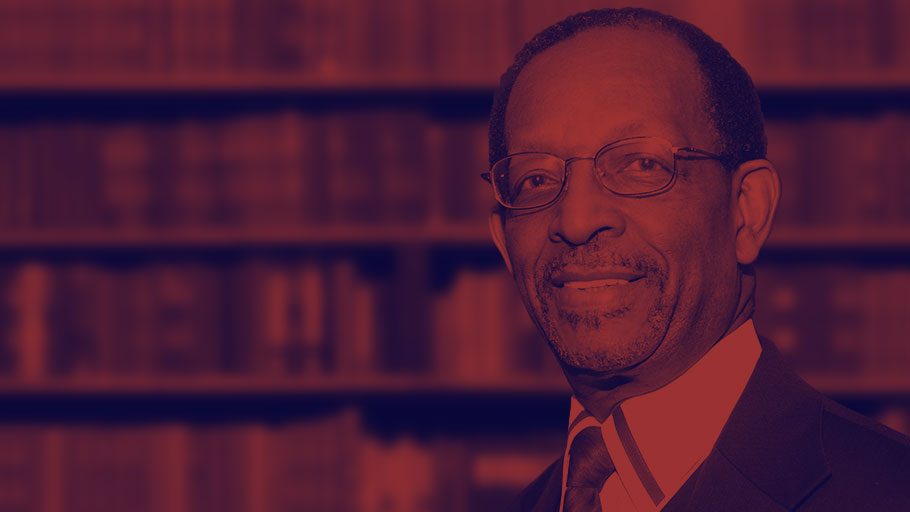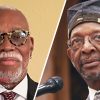The Republican and Democratic Conventions are history, and the campaign for the presidency will shift into high gear. Viewing the two conventions should have given African Americans a glimpse of the difference in composition and direction of the two major parties. As a friend of mine, who is White, remarked, “Ron, the Republican Convention was White, but the Democratic Convention looked like America.” Though people of African descent may have delighted in seeing themselves more robustly represented at the Democratic Convention and took comfort that people of color nationalities were also present in large numbers, diversity in and of itself is not completely satisfying. George Bush can legitimately claim that his administration was one of the most diverse ever, but clearly Black folks viewed his tenure as hostile to Black interests. Beyond diversity, the question Black voters must weigh is the direction of the major party candidates for President and which one offers the best hope of advancing the interests and aspirations of people of African descent.
This is an important matter because Black votes will determine the outcome of elections in key battleground states across the country. And, while there is no question that Blacks will overwhelmingly vote for President Obama again, the crucial question is whether Black voters will turn-out in the record numbers they did in 2008. A recent National Urban League study revealed that a 5% decline in Black voter turn-out could cost President Obama the election. Therefore, the President not only needs 95% of the Black vote, he needs a voter turn-out equal to or exceeding that of 2008.
In part Black voter turn-out will hinge on an assessment of how well Obama’s first term has met expectations for addressing issues that affect the social-economic interests of the Black community. It is no secret that the vast majority of Black people were ecstatic about the election of the first African American President and a sizeable majority are more than pleased that a Black Family resides in the White House. In fact, it’s been extremely difficult to criticize President Obama on any issue for fear of facing a formidable “blacklash!” That notwithstanding, Obama’s failure to more explicitly address Black issues in the face of what I term a “State of Emergency” in America’s “dark ghettos,” has been the subject of persistent discussion and criticism among a significant minority of policy analysts and activists in the Black community. Given the perilous terrain of the 2012 election, disaffection among this segment could lead to defeat of America’s first Black President.
Faced with a choice between Romney and Obama, a friend of mine, a brother who is a frequent guest on mainstream media talk shows, reluctantly conceded that he favored Obama because the President is the “lesser evil.” I cringed when I heard the choice characterized in this way because it smacked of a kind of progressive/left orthodoxy when describing the differences between Democratic and Republican candidates. I have been among those who have dared to offer a critique of President Obama on issues where we disagree, e.g., Military Re-Authorization Act, the invasion of Libya, the war in Afghanistan and the failure to target morally unacceptable levels of joblessness, fratricide and mass incarceration in Black communities. In that regard, I think it is important to establish the principle of “critical support” when dealing with candidates at all levels, including the presidency.
No group which delivers its votes to a candidate should do so without a meaningful expectation of direct and indirect benefits based on an agenda of issues, concerns, programs and policies of importance to its constituents. This is a basic principle of political engagement. Those Blacks who feel that we should uncritically embrace President Obama because he’s Black or because he’s not just “President of Black America,” miss the point. I didn’t vote for Barack Obama for President simply because he was Black but on the basis of a platform and political direction that were much more aligned with a liberal/progressive and Black Agenda than John McCain’s. Barack Obama was the better choice.
That brings me back to the 2012 presidential election. Despite my reservations about some of Obama’s policies and critique of the absence of programmatic policies to directly address the crises afflicting America’s dark ghettos, in the current political environment, President Obama is not the “lesser evil,” but clearly the better choice. When I ran as an independent candidate for President 20 years ago, I called the difference between William Jefferson Clinton and Senator Bob Dole a choice between “tweedle dee and tweedle dum” or the “lesser evil.” In addition to articulating the standard left/progressive view of the two major parties, I was specifically reacting to the Democratic Party’s decisive move to the right with the selection of Clinton, a leader of the “centrist” Democratic Leadership Conference (DLC), as its candidate for President. Contrary to embracing the progressive program and movement of Rev. Jesse L. Jackson and the Rainbow Coalition, Clinton and the DLC believed the best way to win the presidency was by co-opting/adopting key Republican ideas like ending welfare, promoting “free trade” and taking a tougher stance on national defense. It was for this reason that progressives began to term Clinton a “Republicrat.” It is useful to recall that once elected, Clinton spearheaded a drive to end “welfare as we know it,” and vigorously pressed for passage of the North American Free Trade Agreement (NAFTA), both of which were highly unpopular with liberals and progressives.
However, political context is important. While the DLC moved the Democratic Party to the right, the Republican Party of Bob Dole is significantly different from the Tea Party, Grand Obstructionist Party (GOP) of today. Bob Dole was a moderate, a center-right Republican who had cooperated with Democrats on a number of policy proposals. He would not only be unwelcome, he would be run out of the radical/extremist/reactionary conservative Republican Party of today. President Richard M. Nixon would not be welcome in the GOP today either. A recent article in the Business Section of the New York Times: G.O.P Shift Moves Center Far to the Right recounted that Nixon supported Affirmative Action, the Clean Air Act, sponsored the legislation that produced the Environmental Protection Agency and the Occupational Safety and Health Administration. Indeed, Herb Stein, an Economic Advisor to Presidents Nixon and Ford is quoted as saying, “Probably more new regulation was imposed on the economy during the Nixon administration than any other presidency since the New Deal.” The article goes on to note that “Nixon bolstered Social Security benefits. He introduced a minimum tax on the wealthy and championed a guaranteed annual income for the poor. He even proposed health reform that would require employers to buy health insurance for their employees and subsidize those who couldn’t afford it.” Nixon could not survive in today’s GOP.
In the context of the political terrain of 20 years ago, the tweedle dee, tweedle dum, lesser evil refrain was far more applicable and relevant than it is today. Liberals/progressives, Democrats and President Obama now face a radically different Republican Party. There are virtually no moderates left in the GOP. They’ve been purged, and even some who wore the “conservative” brand 20 years ago would face a similar fate. In reality Mitt Romney is one of those “moderates.” Sarah Palin, Newt Gingrich, Rick Santorum were correct to view him suspiciously during the primaries. But, Romney is so obsessed with being President that he has willingly strained to reinvent himself to convince this new extremist version of the Republican Party that he is a true “conservative.” He is a political chameleon who has become the face of the most virulent, anti-women, labor, people of color minorities, lesbian and gay, environment, consumer protection and pro-rich/1% political party we have witnessed in decades.
The Democratic National Convention looked like the emerging new America, not only in terms of its diversity but its political direction. The Democrat’s agenda is by no means perfect when measured by progressive criteria but it points in the correct direction. The nation witnessed speaker after speaker embrace the Affordable Health Care Act, offer commitments to gender equality in the workplace, reproductive rights, marriage equality, labor rights, expanded educational opportunities for students and laid-off workers, immigration, a more green/sustainable economy and regulation of Wall Street. Needless to say, I would of course like to have heard a reference to the State of Emergency in Black America’s dark ghettos and a commitment to address it. However, I am not about to abandon President Obama for that omission alone when many of the issues cited above directly or indirectly favorably impact the quality of life for Black people – issues which are diametrically opposed by the radical/extremist/obstructionist led by Romney and Ryan.
Let me inject another crucial factor into the mix that should influence our choice in this election – the Supreme Court and federal judiciary. Presidential terms are for eight years maximum, appointments to the Supreme Court and federal bench can last through several Presidents. As important as making the choice for President is, it is equally important that we not allow the obstructionists to complete their goal of seizing control of the Supreme Court and the federal judiciary. If Mitt Romney wins, it will be like another “Plessy versus Ferguson” moment with the Courts providing judicial sanction for the drastic reversal of rights envisioned by the GOP.
Given the frightening prospect of a Romney-Ryan/Tea Party dominated administration, Black voters must mobilize to march on ballot boxes with the conviction that President Barack Hussein Obama is by far the better choice to lead this nation toward a “more perfect union.” The “choice” by no means suggests that we should abandon the effort to put forth an agenda to address pressing Black issues or dismiss the idea of creating a “progressive third force in American politics.” I certainly do not plan to abandon either quest. However, the imperative of the moment, a very critical moment, is to mobilize/organize to absolutely ensure that the “better choice” occupies the White House for the next four years! Then we must continue to mobilize/organize to fight for “change we can believe in!”
Note: Organizations or individuals willing to assist with the collective mobilization for SOBWC III should visit the website www.ibw21.org — Email: info@ibw21.org or Call: 888.774.2921
Dr. Ron Daniels is President of the Institute of the Black World 21st Century and Distinguished Lecturer at York College City University of New York. His articles and essays also appear on the IBW website www.ibw21.org and www.northstarnews.com . To send a message, arrange media interviews or speaking engagements, Dr. Daniels can be reached via email at info@ibw21.org















